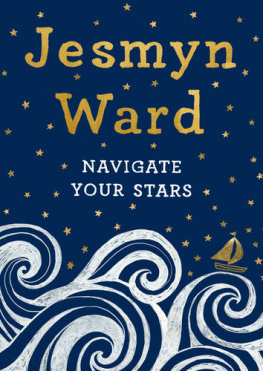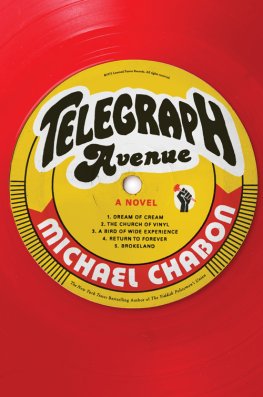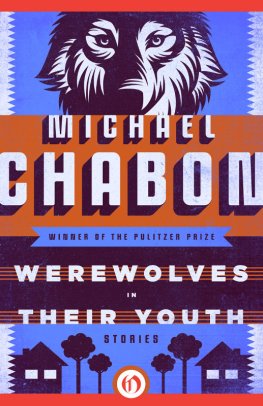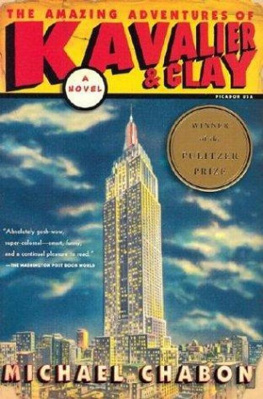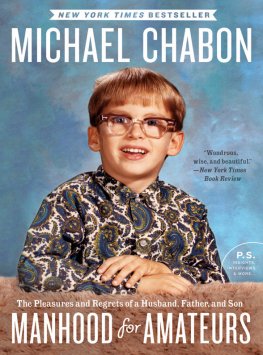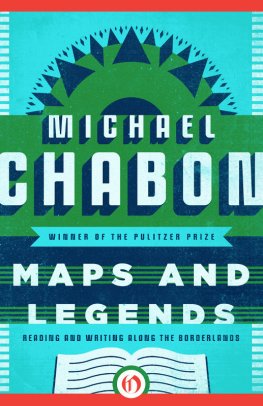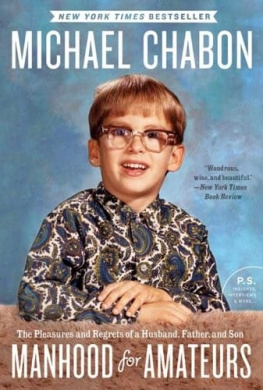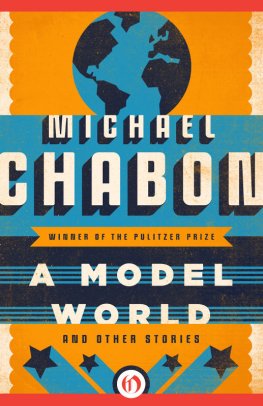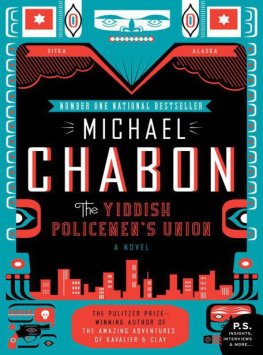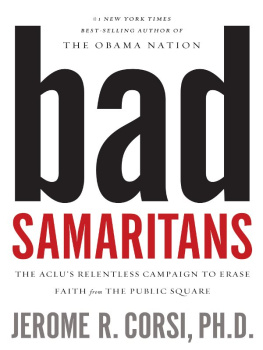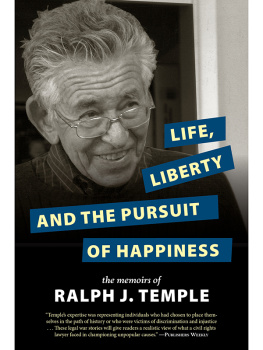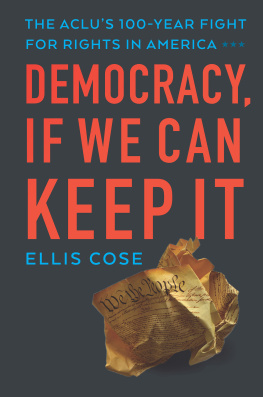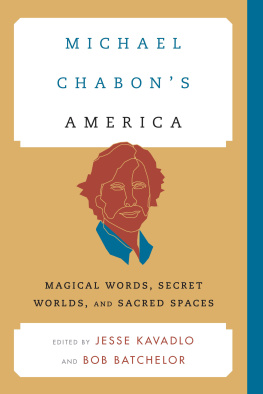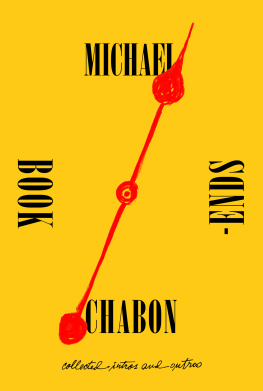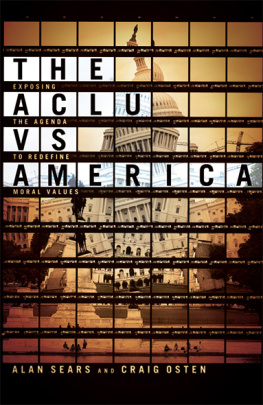Thank you for downloading this Simon & Schuster ebook.
Get a FREE ebook when you join our mailing list. Plus, get updates on new releases, deals, recommended reads, and more from Simon & Schuster. Click below to sign up and see terms and conditions.
CLICK HERE TO SIGN UP
Already a subscriber? Provide your email again so we can register this ebook and send you more of what you like to read. You will continue to receive exclusive offers in your inbox.
To the ACLUs clients, who for over 100 years have refused to accept injustice and have chosen to fight for civil liberties and civil rights
Introduction
MICHAEL CHABON AND AYELET WALDMAN
E very year the moon is struck, and its cratered face forever marred, by tens of thousands of asteroids and meteors. At least that many bodies rain down on Earth over the same period, and yet the Earth has very few craters and endures only a handful of relatively insignificant impact events every year. The difference, of course, is that unlike the moon, the Earth is blessed with and enveloped by an atmosphere that constantly shields it from attack. The Bill of Rights serves a similar protective function for individual Americans and their civil liberties, which, like the Earth, are and have always been under constant, relentless attack. From Plessy v. Ferguson in 1896 to Trump v. Hawaii in 2018, our federal and state governmentsoften abetted by the courtshave sought to curtail, constrain, and infringe on the rights defined and enshrined in James Madisons remarkable document. The protections of liberty and equality it guarantees have always been menaced by the overweening instruments of state and majoritarian power. But lately, as in some science-fiction thriller where the Earth is threatened by a monstrous, meteor-spewing aberration in space-time, the rate and intensity of those attacks seem to be increasing. Meanwhile, agents of the government are at work doing what they can to dilute and undermine both our protective atmosphere and peoples belief in its integrity.
Things, we feel, have been getting worse. Liberty and equality are everywhere under attack. And thats why the work of the American Civil Liberties Union feels more precious to us than ever before. The ACLU lawyers and staff are the brave souls who suit up, blast off, and do what they can to divert and repel all those incoming meteors, or blow them right out of the sky. We admire them. We admire them the way you must admire people who devote themselves to doing, to the utmost of their ability, any thankless, impossible, and absolutely essential job.
Liberty and justice for all. We used to stand up with our classmates every morning and timelessly pledge liberty and justice for all, even and especially for those (as the Supreme Court, agreeing with the ACLU, ruled in West Virginia State Board of Education v. Barnette) whose consciences rebel at being compelled to pledge allegiance to a flag or to a country under God. The Bill of Rights protects pledgers and nonpledgers alike, but of course it is only the nonpledgersthe contrarians, the cranks, the nonconformists, the radicals and fanatics, the outsiders and the ostracized, the powerless and unpopular and imprisonedwho ever really need its protections. They also tend to be the ones least likely to receive those protectionsnot without a fight, anyway. Thats where the ACLU comes in.
The history of the ACLU is one of struggle, combat, of marginalized people and unpopular causes, of troublemakers and conscientious objectors, a history of battle and strife. But it is also the history of the very best our country has to offer to its citizens and, by way of example, to the rest of the world: the strong, golden strand of the Bill of Rights and the ideals it embodies, often frayed, occasionally snarled, stretched at times to the breaking point, but shining and unbroken down all the years since 1789. The ACLU holds the government, the courts, and the nation to their avowed and highest standard, insisting on the recognition of the protections the Constitution affords to every American, no matter how marginalized, no matter how unpopular the cause, even if the people it protects sometimes despise the freedom it represents.
As American Jews in our fifties, we both remember, powerfully, the moment we each first understood the austere and lonely fight of the ACLU, the thankless road to freedom on which it plies its trade. It was 1977, when the ACLU took on the case of the local branch of the American National Socialist Party, whose members wanted to hold a march along the main street of Skokie, a predominantly Jewish suburb outside Chicago. We remember wrestling with the difficult idea that the ACLU could be on the side of good (the First Amendment) and evil (Nazis) at the same time. To understand the vital role that the ACLU plays in American society requires a nuanced understanding of the absolute value of freedom of speech, freedom of assembly, freedom from unwarranted search and seizure, of the right to due process and equal justice under the law, evenagain, especiallywhen those rights protect people we find abhorrent or speech that offends us.
Nuance unfortunately seems to be in very short supply nowadays. In these pages, we have collected essays by some of our countrys finest writersnot just because writers are and have long been among the principal beneficiaries and guardians of the First Amendment but also because they traffic, by temperament and trade, in nuance and its elucidation, in ambiguity and shades of gray. We turn to writers, here and in general, to help us understand and, even more, grasp both ends of ambiguities, to expand the scope of our vision to encompass the whole gray spectrum of human existence, in all its messy human detail.
Each of the writers in this book has chosen a seminal case in which the ACLU was involved, either as counsel or as amicus curiaefriend of the courtand made it the subject of an essay. Some have chosen to dig deep into the facts of the case and bring them vividly to life. Others have focused on their own personal experience with the civil libertyand its abridgmentat issue by the case. Still others have crafted impassioned pleas on behalf of the rights being challenged or upheld in a particular Supreme Court case or have even, in at least one case, taken a reasoned position opposed to the ACLUs own. Regardless of approach each of the writers has, we hope you will agree, produced something thoughtful, challenging, enlightening, and as worthy of your time as the ACLU is worthy of your support.
Enjoy.
Foreword
DAVID COLE
T he decisions of the courts have nothing to do with justice. So proclaimed Morris Ernst, the ACLUs first general counsel, in 1935. You wont hear that from ACLU attorneys these days. The ACLU has spent the better part of its 100 years seeking justice from the courtsand often getting it. The cases that inspired the essays in this book are only a small selection of the ACLUs victories. Over the course of the ACLUs first century, the courts have recognized substantial safeguards for free speech and free press; protected religious minorities; declared segregation unconstitutional; guaranteed a womans right to decide when and whether to have children; recognized claims to equal treatment by women, gay men, and lesbians; directed states to provide indigent criminal defendants an attorney at state expense; regulated police searches and interrogations; and insisted on the rights to judicial review of immigrants facing deportation and even foreign enemy combatants held at Guantnamo in the war on terror. In thousands of cases brought or supported by the ACLU, the courts have extended the protections of privacy, dignity, autonomy, and equality to an ever-widening group of our fellow human beings. We can expectand must demandjustice from the courts.

